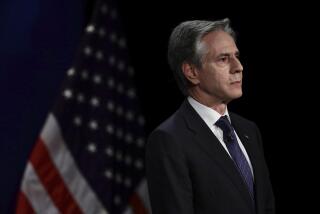Bush Warns Moscow That Attempt at Forcible Intervention Is ‘Bound to Backfire’ : Lithuania: The White House also protests an expulsion order against a pair of U.S. envoys.
- Share via
WASHINGTON — With tension mounting in Lithuania, President Bush on Friday issued his sharpest warning to date to Soviet leaders, and the White House protested an expulsion order against two American diplomats from Vilnius, the Lithuanian capital.
“Any attempt to coerce or intimidate or forcibly intervene against the Lithuanian people is bound to backfire--that is inevitable,” Bush said in remarks to out-of-town newspaper reporters and editors at a White House lunch. “We have made clear to the Soviet Union that the situation in Lithuania can only be solved peacefully.”
Shortly after Bush spoke, White House officials were informed of the expulsion order and quickly issued a protest statement.
“This action certainly adds to our concerns,” the statement said. “This does not contribute to a lessening of tensions that would make productive dialogue easier. We have protested, especially in light of the fact that the United States has not acted in any way to exacerbate tensions.”
Responding to reports that foreign journalists were refused permission to go to Lithuania on Friday, the White House added that any restrictions on foreign journalists in Lithuania would “undermine the spirit of glasnost (openness).”
Said White House Press Secretary Marlin Fitzwater, “The situation appears to progressively get worse.”
Bush’s remarks represented his third public message to the Soviets this week on the Lithuania stalemate and clearly his most anxious. But the message was notable not only for what it said but for what it left out.
The White House repeatedly has urged Gorbachev to avoid “the use of force” in Lithuania. Bush also has called on Moscow to open negotiations with the Lithuanians over their future.
At the same time, however, Bush in his latest comments as well as in earlier remarks has recognized “longstanding (Soviet) interests in Lithuania.” And the Administration carefully has avoided calling for immediate Lithuanian independence or setting any other bottom line that might prove impossible for Soviet President Mikhail S. Gorbachev to meet.
The implication left by the Administration’s statements is that while forcible suppression of Lithuanian independence efforts would damage U.S.-Soviet relations, a resolution of the conflict that avoids outright violence, even if it stops short of granting independence to the Baltic republic, might be acceptable to the United States.
As recently as several days ago, Administration officials seemed generally to believe that Gorbachev was maneuvering to drive a hard bargain with the Lithuanians but would, eventually, allow them to leave the Soviet Union. Now, however, U.S. analysts differ over what they think will happen in Lithuania over the next several days.
“Your guess is as good as ours,” said one Administration official, noting that the Administration has had no direct contacts with the Lithuanian leadership since the crisis began.
Another official pointed to a new Soviet law that establishes procedures under which any one of the 15 Soviet republics can secede. The procedures under the law would require at least five years of transition before independence is achieved.
The Lithuanians argue that they are not covered by the law because they declared independence before it was passed. But, this official suggested, Gorbachev may be hoping to back the Lithuanian leadership into accepting the new law’s process, a step that would buy him at least five years in which to deal with other pressing problems.
Bush also repeated his call for Congress to pass his aid package for Nicaragua and Panama and defended his Administration’s policy toward South Africa.
“This hemisphere, the Americas, can become the first where democracy prevails from north to south,” Bush said. “But it cannot happen if we in the United States fail to add our strength and support to the forces of democracy.
“With democracy at stake, we really cannot afford delay.”
Bush also said he recognizes that “foreign aid is not the most popular account to vote for” but that “it is in our own national interest” to support democracy elsewhere. In any case, he added, “in terms of the total percentage of the budget, (foreign aid) still remains a relatively small part.”
U.S. foreign aid has averaged about $15 billion per year for the last decade, roughly 1.5% of the total federal budget.
On South Africa, Bush repeated that current U.S. sanctions will remain until the government there meets conditions laid down in U.S. law.
“Our law requires holding the line,” he said. But, he added, no new sanctions should be adopted at this point.
More to Read
Get the L.A. Times Politics newsletter
Deeply reported insights into legislation, politics and policy from Sacramento, Washington and beyond. In your inbox twice per week.
You may occasionally receive promotional content from the Los Angeles Times.











